Signalis review - a sumptuously atmospheric survival horror
Dear Elster.
I can't tell you what events literally happen in Signalis, the debut game for studio Rose Engine, or in what order they occur. The entire game is an intentionally hazy nightmare. But how it made me feel is clear as day, because it is a profoundly affecting experience, both in the unnerving dread of its moment to moment exploration and fighting and also in the larger arc of its story: a rumination on identity and memory that haunts me. I've thought of little else since I finished it. Now, as if struck by a cosmic curse, I intend to bring anyone who will listen into the fold of this masterful survival horror.
In the simplest terms, Signalis is a throwback to early Resident Evil games or Silent Hill, minus the tank controls. From above, you explore the decrepit facilities of an isolated planet as Elster, an android, who has awoken in search of a woman she holds dear. How you came to be there - and what exactly happened to reduce the local android population into shambling horrors - are the mysteries that will compel you as much as the resolution of Elster's mission. Though, as with any good tale of terror, there are no easy answers to be found. In her shoes you will be exploring, gathering tools and weapons, managing resources and fending off monsters. These are very familiar components of survival horror but it's been a while since I've played one assembled this neatly and presented with such visual flair.
This is a PS1-styled science fiction world with every detail accounted for, from the logos of every entity to the intricate design of its machines. Stark lighting and the use of reflections heighten the ambiguity already inherent in the stylised 3D, where each dark corner and silhouetted figure leapt straight into my imagination. Tangible in spite of its minimalism, it's a world whose cold concrete walls you can feel or whose flaking paint you can smell, where cameras follow every move you make, assuring you that someone or something is always watching. It's a grounding that makes each increasing departure from reality all the more effective. This is a place out to get you.
Retro applies to more than its aesthetic and mechanical call backs to older games, mind. It's woven into the setting itself. VHS tapes in space! Floppy disks! It's delightfully archaic. Even the weapons are decidedly lo-fi, almost vintage. A future built on history, painting a society stuck in a loop, beholden to the crumbling infrastructure of an empire in decay. Which sucks for the people but helps the game's puzzles, often the downfall of survival horror games, by having tactile, chunky interfaces (reminiscent of Alien Isolation's gizmos) that are pleasing to tinker with. Though, it is asking more of players than assembling colour coded jigsaw pieces. The Metal Gear Solid-style radio, which can be tuned to various frequencies, is a perfect example. At times it can be used to receive information but you might also need a cipher to decrypt what you hear, or to play the radio in the world to interact with certain scenes. Thinking outside of the box was essential for me to progress and if there's an option buried in an interface, be damn sure you'll need to use it eventually.
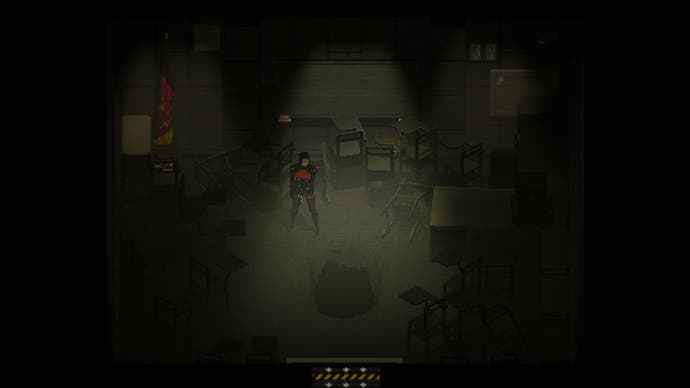
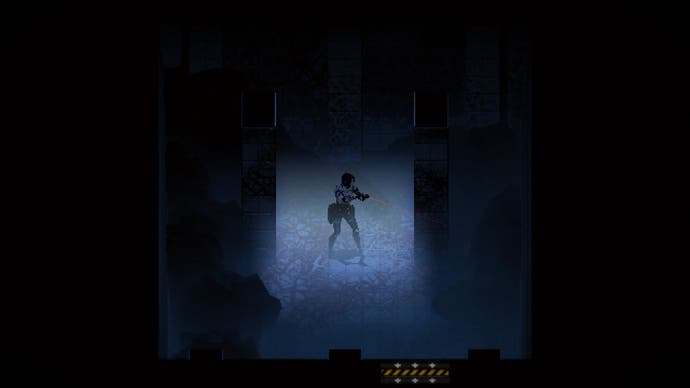
That radio is part of a flawless soundscape, stacked with memorable effects and cues as well as an unsettling ambience. Who knew fans could whir so menacingly, or my own footsteps reverberating down a metal ladder would put me on edge? And the music! There's a truly excellent, understated, evocative phantom of a score by 1000 Eyes & Cicada Sirens but I'm equally impressed by the deployment of Classical or Romantic music throughout. Those following the story and who know their Tchaikovsky will not be entirely surprised to hear Swan Lake at a pivotal moment, adding to the doom hanging over Elster's quest. Every layer of it is dense with meaning and I felt fully enveloped in this experience, from beginning to end. Which made it all the easier to be frightened.

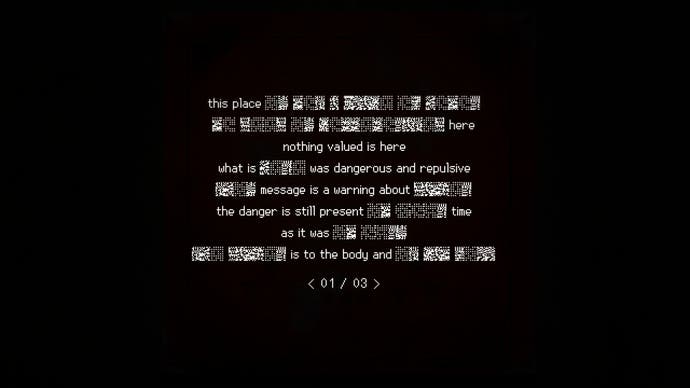
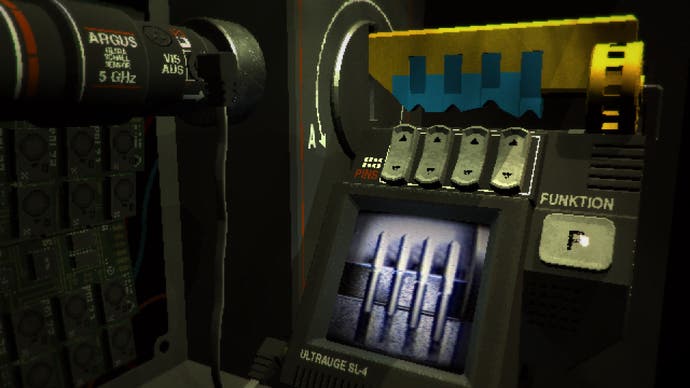
To Signalis's credit, there is no reliance on jump scares. I counted only a small (extremely effective) handful throughout. Instead, we have a classic bit of the old slow-burning dread. Long stretches of nothing happening, dwindling supplies, locked doors. So many times Signalis will feel like it's building to an ambush only to subvert expectations completely. It felt so fine-tuned to exactly how I was playing and knew just when to withhold ammo or put in a long stretch between save points. The real battle is planning your routes and balancing your inventory to make sure you're well equipped but always leaving room for what you might need to collect. Even when you're revisiting an area, you'll end up sneaking past foes when low on bullets, or have to contend with corpses who will revive themselves on a whim. If there's a system or way to anticipate these revivals, I never figured it out. You'll never feel safe.
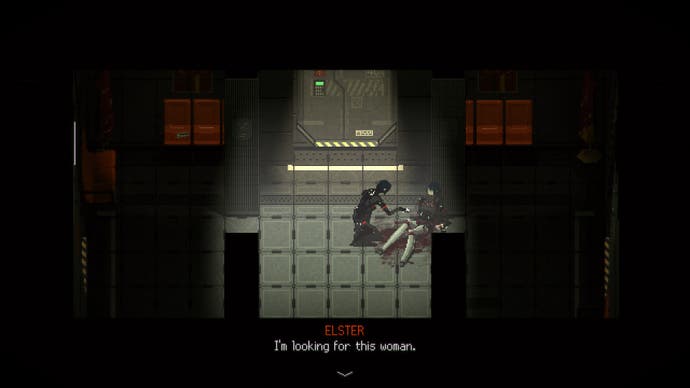
Signalis will spend hours establishing rules only to upend them, breaking even its own continuity. Dream or memory sequences bleed into the real world and it's very unclear where one ends and the other begins. I always found an elegant internal logic behind these twists. Things that seem like minor inconveniences, like being shunted to the main menu upon a death, become just another way to tell the story. A great deal of thought has clearly gone into populating the game with all manner of tools to pull the rug from under players. It made me seek the truth like searching for solid ground in shifting sands, propelled to the point of being willing to drop down into a blood stained hole in the earth, driven by each precious clue towards just what the hell is going on.
Each subplot and allusion is a tragedy, all overlapping, imparting meaning to the other. Where is the line between love and obsession? Determination and ignorance?
I imagine diehard fans will be picking over every line of dialogue, visual cue and choice reference for some time. Signalis is steeped in influences, ranging from Ghost in The Shell to Stanley Kubrick and everything in between. A centrepiece of the plot is The King in Yellow by Robert W.Chambers, explicitly tying the game to its literary forebears. Signalis wears those inspirations on its sleeve but never do they override its own identity, they simply help frame its events. I've been left thinking about its own moments, not those of the works it touches upon. Funny, for a game all about struggling to hold on to your sense of self.
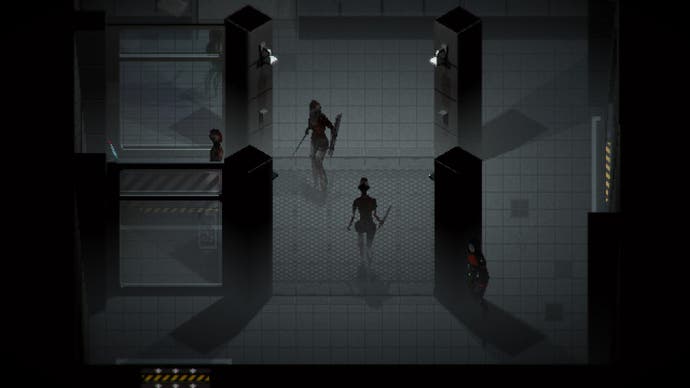
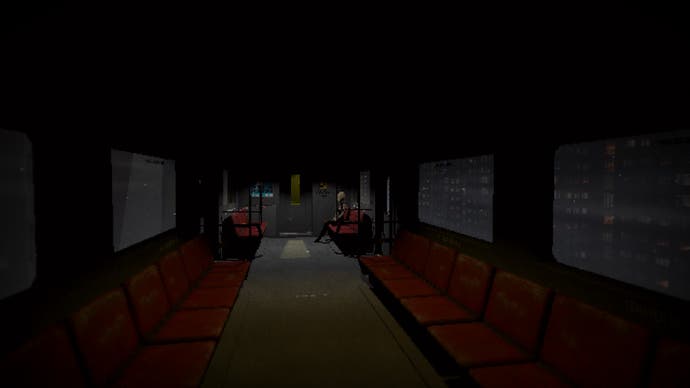
Each subplot and allusion is a tragedy, all overlapping, imparting meaning to the other. Where is the line between love and obsession? Determination and ignorance? As Signalis's cast of characters struggle to trust their own reality or even their own memories, these emotions all become intertwined into something monstrous, unreconcilable. In all of that horror, Elster remains a rock. Stoic characters run the risk of being dull but that's balanced here by subtle hints towards her inner thoughts, while her determination to find the woman she loves is a comfort, especially when faced with futility. Like Elster, I never stopped fighting to reach the end of her mission. Hope is all you have.
Through its formidable scares Signalis lets light into the wounds of a horrifying existence. This is a game about more than overcoming living nightmares. It is about choosing to persist in the face of an uncaring universe, about continuing to stand when your identity and your body is dehumanised. Science fiction and survival horror that uses the past to craft something thoroughly modern. Like a dying star, Signalis burns bright: beautiful, terrifying and unmissable.



